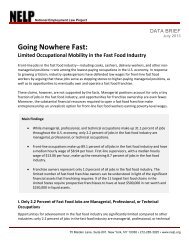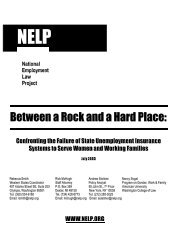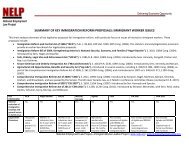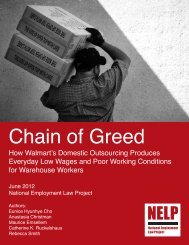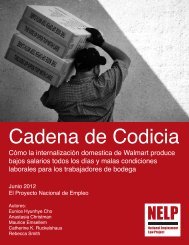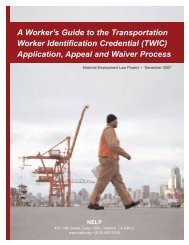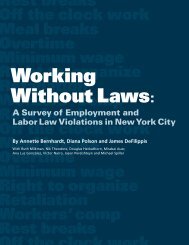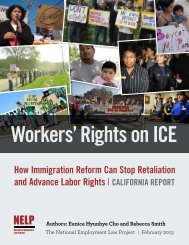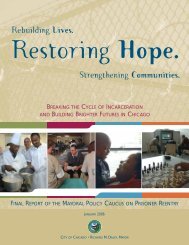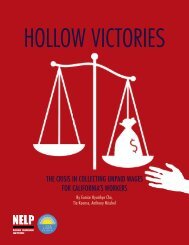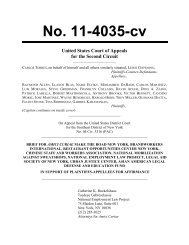National Employment Law Project
National Employment Law Project
National Employment Law Project
You also want an ePaper? Increase the reach of your titles
YUMPU automatically turns print PDFs into web optimized ePapers that Google loves.
<strong>National</strong> <strong>Employment</strong><br />
<strong>Law</strong> <strong>Project</strong><br />
September 25, 2008<br />
Sent via regular mail and email to http://www.regulations.gov<br />
Richard M. Brennan, Director<br />
Office of Interpretations and Regulatory Analyses<br />
U.S. Department of Labor<br />
<strong>Employment</strong> Standards Administration<br />
Wage and Hour Division<br />
200 Constitution Avenue, Room S-3506<br />
Washington, D.C. 20210<br />
Re: Comments on Notice of Proposed Rulemaking No. RIN 1215-AB13<br />
Dear Mr. Brennan:<br />
Delivering Economic Opportunity<br />
The <strong>National</strong> <strong>Employment</strong> <strong>Law</strong> <strong>Project</strong> (NELP) and other signatories to this letter submit these<br />
comments to the U.S. Department of Labor’s (USDOL) Notice of Proposed Rulemaking<br />
(NPRM) regarding a variety of provisions in the Fair Labor Standards Act of 1938 (FLSA) and<br />
the Portal-to-Portal Act of 1947, issued for comment on July 28, 2008.<br />
The <strong>National</strong> <strong>Employment</strong> <strong>Law</strong> <strong>Project</strong> is a non-profit organization that advocates on behalf of<br />
low-income workers and the unemployed. For over 30 years, NELP has worked with state and<br />
local advocates around the country, including legal services offices, community groups, and<br />
labor organizations to ensure workplace protections, including the right to be paid the minimum<br />
wage and overtime pay for low-wage and immigrant workers. NELP’s <strong>National</strong> Wage & Hour<br />
Clearinghouse at www.just-pay.org supports public agency and individual enforcement of wage<br />
and hour laws in order to advance economic security for all workers.<br />
The other signatories to this letter are organizations with wide experience working with lowerincome<br />
workers who would be adversely affected by the proposed regulations. A listing of those<br />
signatories is at the end of these comments.<br />
The signatories to this letter and their constituents have a direct and sustained interest in a strong<br />
Department of Labor and its full enforcement of our nation’s fair pay statute. Upholding the<br />
minimum wage and overtime pay for our workforce is essential for employers who play by the<br />
rules and for low-wage workers who comprise a disproportionate and growing share of the<br />
workforce.<br />
Together we appreciate the opportunity to comment on the proposed regulations.
Our comments begin with a description of the role the USDOL should take when issuing<br />
proposed regulations impacting coverage under any provision of the FLSA. We then touch on<br />
four specific areas included in the NPRM: (1) Employee Commuting Flexibility Act; (2) tip and<br />
meal credit rules; (3) fluctuating workweek method of computing overtime, and (4) service<br />
advisors working for auto and boat dealerships<br />
I. The USDOL’s Role in Interpreting and Enforcing the FLSA.<br />
The Secretary of Labor is responsible for enforcing the FLSA as amended by the Portal-to-Portal<br />
Act. 29 U.S.C. §§ 204, 211, 216(c), 259. In establishing the Department of Labor (DOL) in<br />
1913, Congress stated that its purpose “shall be to foster, promote, and develop the welfare of the<br />
wage earners of the United States.” 1 USDOL mishandles its protective role with several of the<br />
proposed rules in the NPRM, by improperly narrowing the coverage of the FLSA.<br />
The original purpose of the Fair Labor Standards Act of 1938 was to eliminate "labor conditions<br />
detrimental to the maintenance of the minimum standard of living necessary for health,<br />
efficiency, and general well-being of workers" by "insuring to all our able-bodied working men<br />
and women a fair day's pay for a fair day's work." A.H. Phillips, Inc. v. Walling, 324 U.S. 490,<br />
493 (1945) (quoting Message of the President to Congress, May 24, 1934); 29 U.S.C. § 202(a).<br />
The minimum wage provisions were enacted to ensure that those dependent on others for their<br />
livelihood maintained the minimum standard of living espoused by the Act. See Brooklyn<br />
Savings Bank v. O’Neil, 324 U.S. 697, 706-07 (1945); Barrentine v. Arkansas-Best Freight<br />
System, Inc., 450 U.S. 728 (1981).<br />
Congress recognized that its legislation would be ineffective if companies that complied with<br />
these laws experienced economic pressure from competitors who could cut their costs by<br />
flouting the FLSA's minimum labor standards. The FLSA<br />
seeks to eliminate substandard labor conditions, including child labor, on a wide<br />
scale throughout the nation.... This purpose will fail of realization unless the Act<br />
has sufficiently broad coverage to eliminate in large measure from interstate<br />
commerce the competitive advantage accruing from savings in costs based upon<br />
substandard labor conditions.<br />
Roland Electrical Co. v. Walling, 326 U.S. 657, 669-70 (1946). Accordingly, section 2(a)(3) of<br />
the FLSA declares that substandard labor conditions constitute "an unfair method of competition<br />
in commerce." 29 U.S.C. § 202(a)(3).<br />
The Act expects that most workers will not work for less than the minimum wage. 29 U.S.C. §<br />
201, 202(a); Brennan v. Heard, 491 F.2d 1, 4 (5 th Cir. 1974) (Congress’ purpose in passing the<br />
FLSA was to enable a substantial portion of the American work force to maintain a minimum<br />
standard of living).<br />
1 An Act to Create a Department of Labor, ch. 141, s 1, 37 Stat. 736 (1913) (codified at 29<br />
U.S.C. § 551 (1988).<br />
2
FLSA Exemptions Must Be Read Narrowly.<br />
The Supreme Court has emphasized that the "breadth of coverage" of the FLSA is "vital to [its]<br />
mission" of establishing a national work week standard and that statutory exemptions to the Act<br />
should be narrowly construed. 2 The presumption must be that all workers are covered. 3<br />
USDOL’s proposed regulations narrow the FLSA in a way that will significantly reduce worker<br />
protections in a variety of industries including delivery, restaurants and hospitality, limousine<br />
and taxi, retail, nursing homes, and food service, where every paycheck counts. In this way the<br />
proposed rules flout the purposes of the FLSA and send a message to employers that they have<br />
nothing to fear in the USDOL. 4<br />
II. USDOL Proposed Regulations<br />
A. Employee Commuting Flexibility Act of 1996 (ECFA), at 73 Fed. Reg. 43656<br />
The Portal-to-Portal Act (29 U.S.C. § 251 et seq) amended the FLSA in 1947 to bar recovery of<br />
hours spent on duties that were preliminary and postliminary to an employee’s principal<br />
activities and on duties that are not “integral and indispensable” to an employee’s principal<br />
activities. 29 U.S.C. § 254(a)(1)-(2).<br />
The Employee Commuting Flexibility Act of 1996 (“ECFA”) amended section 254(a) of the<br />
Portal-to-Portal Act to permit employees and employers to agree that time spent on activities<br />
incidental to normal to-and-from work commuting in an employer-provided car is not<br />
compensable. Pub.L. 104-188, § 2102 (1996); 29 U.S.C. § 254(a).<br />
ECFA added the following language to 29 U.S.C. § 254(a)(2):<br />
For purposes of this subsection, the use of an employer’s vehicle for travel by an<br />
employee and activities performed by an employee which are incidental to the use<br />
of such vehicle for commuting shall not be considered part of the employee’s<br />
principal activities if the use of such vehicle for travel is within the normal<br />
commuting area for the employer’s business or establishment and the use of the<br />
2 Powell v. United States Cartridge Co., 339 U.S. 497, 516 (1950); Mitchell v. Kentucky<br />
Finance Co., 359 U.S. 290, 295 (1959).<br />
3 Powell v. United States Cartridge Co., supra, 339 U.S. at 516; Arnold v. Ben Kanosky, Inc.,<br />
361 U.S. 388, 392 (1960).<br />
4 United States Government Accountability Office, “Better Use of Available Resources and<br />
Consistent Reporting Could Improve Compliance,” (GAO-08-962T); “Case Studies from<br />
Ongoing Work Show Examples in Which Wage and Hour Division Did Not Adequately Pursue<br />
Labor Violations,” (GAO-08-973T); and see, David Weil, “Crafting a Progressive Workplace<br />
Regulatory Policy: Why Enforcement Matters,” 28 Comp. Lab. <strong>Law</strong> & Pol’y Journal 125<br />
(Spring 2007).<br />
3
employer’s vehicle is subject to an agreement on the part of the employer and the<br />
employee or representative of such employee.<br />
Our comments urge the USDOL to take this opportunity to anticipate possible confusion<br />
regarding the scope and impact of the ECFA by rescinding its existing proposed regulations and<br />
clarifying in newly-issued proposed rules that the ECFA is a narrow amendment to the Portal-to-<br />
Portal Act that does not otherwise alter the analysis of compensable activity under the FLSA.<br />
1. USDOL Proposal<br />
USDOL’s proposed regulations at 73 Fed. Reg. 43672, insert statutory language from the 1996<br />
amendment into four existing DOL regulations, at 29 C.F.R. §785.9; 29 C.F.R. §785.34; 29<br />
C.F.R. § 785.50, and 29 C.F.R. § 790.3.<br />
2. Comments to the proposed rule<br />
To assess the impact of these proposed regulations, it is important to recall the underlying<br />
statutory scheme and its purposes, which are left unchanged by the 1996 ECFA amendments.<br />
Just as the FLSA’s exemptions are to be construed narrowly, Arnold v. Ben Kanowsky, Inc., 361<br />
U.S. 388, 392 (1960), so must the Portal-to-Portal Act’s exceptions be read narrowly, affording<br />
broad statutory coverage to ensure compensation for all hours worked. Barrentine v. Arkansas-<br />
Best Freight System, Inc., 750 F.2d 47, 50 (8 th Cir. 1984); Bobo v. United States, 37 Fed. Cl. 690,<br />
694-95 (1997).<br />
(a) ECFA did not change the FLSA’s analysis of the workday and what constitutes<br />
principal activities<br />
The ECFA’s amendment to Section 4 of the Portal-to-Portal Act does not affect the computation<br />
of hours worked within the ``workday,'' which is defined as the period between ``the time on any<br />
particular workday at which such employee commences (his) principal activity or activities'' and<br />
``the time on any particular workday at which he ceases such principal activity or activities.'' 29<br />
C.F.R. § 785.9.<br />
Post-ECFA, there therefore remain instances where time spent in an employee’s own or in an<br />
employer-provided car does constitute compensable time. Those include situations where an<br />
employee engages in work activities required by the employer, for example, making them<br />
integral and indispensable, situations where the commuting time is not a usual amount, and<br />
situations where there is a custom or practice at the place of employment to compensate for the<br />
time. 29 U.S.C. § 254 (b); 29 C.F.R. § 790.4.<br />
So, for example, in Burton v. Hillsborough County, 181 Fed. Appx. 829, 835 (11th Cir. 2006)<br />
(unpublished), public work inspectors required by the county to pick up and then drive county<br />
vehicles to job sites had to be compensated for time spent driving from the pick-up site to their<br />
first job site, and on the way back from their last job site and the drop-off site at the end of the<br />
day. The court noted:<br />
Where an employer's mandate or job requirement interrupts an employee's home-<br />
4
Id. at 835.<br />
to-work and work-to-home path, the travel time necessary for the employee to<br />
fulfill that requirement falls outside of Portal-to-Portal exempted activity, and is<br />
therefore compensable under the Fair Labor Standards Act (FLSA); this is true<br />
even when an employee is using an employer-owned vehicle. Portal-to-Portal Act<br />
of 1947, § 4(a), 29 U.S.C.A. § 254(a); 29 C.F.R. § 785.38.<br />
In Reich v. Brenaman, 1997 U.S. Dist. LEXIS 4163, at *15, the court emphasized the limited<br />
nature of the ECFA:<br />
Section 254(a) exempts travel time and preliminary or postlimary activities from<br />
the compensation requirements of the FLSA. The [ECFA] amendment at issue did<br />
not create a third, distinct exception to the requirement that employers pay their<br />
employees for all principal activities. Instead, the amendment was placed in the<br />
statute below the two existing exceptions. Such a placement indicates that it is<br />
intended to clarify the limits of those exceptions and assist courts in determining<br />
the meaning of "principal activity," not that it creates a third exception…. Instead,<br />
Congress clarified that the mere use of an employer's vehicle by an employee,<br />
without further work performed for the employer, is not compensable.<br />
USDOL’s regulatory proposals should do nothing to in any way limit the compensability of<br />
hours worked in a workday, and nor should any language in the preamble suggest that this is the<br />
case.<br />
In the preamble to the Notice of Proposed Rulemaking, USDOL cites the House Committee<br />
Report (at H.R. Rep. No. 104-585, at 5 (1996)) to support its conclusion that “activities that are<br />
merely incidental to the use of the vehicle for commuting at the start or end of the day are<br />
similarly noncompensable, such as communication between the employee and employer to<br />
obtain assignments or instructions, or to report work progress or completion.” Fed. Reg. at<br />
43656. This suggestive language is not reflected in the proposed regulations, nor is it in the<br />
statute. These vague scenarios create confusion where clear examples by USDOL could avoid it.<br />
The statute only excepts compensation for time spent on activities that are “incidental” to<br />
commuting in a company car. USDOL’s preamble language could lead some employers to argue<br />
and some courts to find that work-related activities that are for the benefit of the employer and<br />
are principal duties are still not compensable as long as the employee is commuting in an<br />
employer-provided vehicle pursuant to an agreement. This interpretation would shoehorn<br />
genuine work time into the exemption and is not permissible under the FLSA. An example of<br />
this is seen in a magistrate judge’s opinion in Buzek v. Pepsi Bottling Group, 501 F. Supp. 2d<br />
876 (S.D. Tex. 2007), where the court held that a Pepsi driver’s time spent in the truck after last<br />
service call of the day transporting tools and making end-of-day reports from home were not<br />
compensable because they were incidental to commuting under ECFA. This interpretation is not<br />
correct under current law.<br />
5
Work activities performed before any commuting starts are compensable, as are work activities<br />
that happen after. Post-ECFA cases have so held, for a range of different jobs. See Powell v.<br />
Carey International, Inc., 514 F. Supp. 2d 1302, 1322 (S.D. Fla. 2007) (limousine drivers raised<br />
a factual question as to whether the cleaning, inspection and maintenance activities on their<br />
employer-provided cars done prior to the first pick-up is compensable activity); Boudreaux v.<br />
Bantec, Inc., 366 F. Supp. 2d 425, 432 (E.D. La. 2005)(finding genuine issue of fact as to<br />
whether boxing up parts at home after a computer technician’s service call is a “principal<br />
activity.”); Dooley v. Liberty Mutual Ins. Co., 307 F. Supp. 2d 234 (D. Mass. 2004)(checking<br />
email and voice mail, preparing computers and returning telephone calls at home are part of<br />
regular work); ; see also, DOL Opinion Letter July 28, 1997, LEXSEE 1997 DOL WH LEXIS<br />
32 (finding that a police office called to an emergency while commuting becomes “on-duty”<br />
once he/she responds to the call)..<br />
USDOL should therefore repeal its proposal with respect to ECFA and reissue proposed<br />
regulations with clear language that “otherwise non-compensable [traveling] is not compensable<br />
merely because the employee uses his employer's vehicle. United Transp. Union Local 1745 v.<br />
City of Albuquerque, 178 F.3d 1109, 1117 (10th Cir.1999). Likewise, otherwise compensable<br />
travel time does not become non-compensable simply through the use of an employer-owned<br />
vehicle.” Burton at 835.<br />
Whether or not work performed is a “principal activity” and thus compensable should not depend<br />
on the time of day the work is performed. If reporting and calling in and writing up service calls<br />
is a part of the regular work of employees in the ordinary course of the business (as would be<br />
reporting a service call in between calls during a workday), then the end of the day calling in,<br />
writing up and reporting should be treated the same. See, e.g., Dunlop v. City Elec., Inc., 527<br />
F.2d 394, 400 (5 th Cir. 1976) (pre-ECFA case for electrical employees performing early morning<br />
work at their workshop prior to driving to jobsites to do electrical repair work).<br />
USDOL’s new proposed regulations should include examples of compensable and<br />
noncompensable time, and include examples of activities that are “incidental” to commuting in<br />
an employer-provided vehicle. See H.R. Rep. 104-585, at 4 (noting that USDOL should describe<br />
those incidental activities).<br />
(b) DOL should not on its own broaden the impact of the ECFA<br />
ECFA was passed in response to USDOL opinion letters, written in 1994 and 1995, setting forth<br />
the USDOL’s position on compensability of home-to-work commuting time in employerprovided<br />
vehicles. H.R. Rep. 104-585 at p. 3. Both USDOL letters held that time spent<br />
traveling between the employees’ home and work at the beginning and the end of the day was<br />
compensable, absent certain specific circumstances. The 1995 USDOL Opinion Letter was<br />
written in response to letters from members of Congress to USDOL asking it to rescind its 1994<br />
position finding coverage. Congress was not satisfied with DOL’s 1995 revision of its earlier<br />
1994 letter, and so passed the ECFA. H.R. Rep. 104-585 at 3. USDOL should continue to<br />
narrowly interpret exemptions from the FLSA, as it has in the past.<br />
6
Repair and delivery workers, inspectors, bus and limousine drivers, and many other workers are<br />
potentially impacted by these rule changes. In these times of high fuel costs and increasing<br />
economic pressure on workers and their families, DOL should assure that its role as an<br />
enforcement agency to uphold the FLSA and ensure its broad reach is paramount.<br />
B. Tip and Meal Credit Rules, at 73 Fed. Reg. 43656-59<br />
Employers are generally prohibited from taking workers’ tips under the FLSA, which establishes<br />
a minimum “wage” exclusive of most tips. See 29 U.S.C. §§ 206(a), 203(m). As USDOL<br />
described, “[the legislative history] makes it clear that the term ‘wages’ as defined in Section<br />
3(m) does not include ‘tips,’ except [for the narrowly defined tip credit].” Wage and Hour<br />
Opinion Letter, WH-321 (Apr. 30, 1975). USDOL concluded that workers’ tips are protected<br />
regardless of whether an employer takes the tip credit:<br />
If an employer should elect not to avail himself of [the tip credit], he would have<br />
to pay his tipped employees in accordance with the Act's minimum wage<br />
standards and, in addition, allow them to keep their tips since, as pointed out in 29<br />
CFR 531, “A tip is a sum presented by a customer as a gift or gratuity in<br />
recognition of some service performed for him.” Id.<br />
Despite these protections, our nation’s tipped workers still struggle to get by. While millions of<br />
tipped workers rely on tips to make ends meet, the federal minimum wage for tipped workers has<br />
been stuck at $2.13 for over 17 years. See William G. Whittaker, Congressional Research Service<br />
Report for Congress: The Tip Credit Provisions of the Fair Labor Standards Act (2006),<br />
available at http://assets.opencrs.com/rpts/RL33348_20060324.pdf. Moreover, tipped workers<br />
make up a substantial share of some of our fastest growing service industries, ranging from<br />
restaurants and coffee shops to personal services like nail salons and car washes.<br />
But many of these industries are marked by high rates of workplace violations, in part due to the<br />
unique enforcement challenges that tips present. Few employers accurately keep the tip records<br />
that are legally required. 29 C.F.R. § 516.28; 29 U.S.C. § 211(c). And since many tips are<br />
provided in cash, they afford unscrupulous employers with an opportunity to misappropriate a<br />
portion of workers’ income without records.<br />
Complicated tip-sharing arrangements also facilitate employment law violations. The FLSA<br />
allows workers to share tips either by “tipping out” their coworkers – voluntarily handing a<br />
portion of their tips to non-servers – or by participating in a “tip pool” wherein all tipped workers<br />
combine their tips and redistribute them according to an established formula. See 29 U.S.C.<br />
§ 203(m).<br />
As a result, courts around the country have found employers liable for millions of dollars in<br />
illegally distributed tips. See, e.g., Chou v. Starbucks Corp., No. GIC 836925, Cal. Super. Ct.<br />
(Mar. 20, 2008) (holding Starbucks liable for $86 million plus interest in damages because the<br />
company illegally allowed managers to share in employees’ tips); Jonathan Saltzman, “Logan<br />
Skycaps Win $325,000 in <strong>Law</strong>suit Over Tips,” BOSTON GLOBE, Apr. 7, 2008. And the New<br />
York State Department of Labor recently conducted an industry-wide compliance survey of car<br />
7
washes, finding that managers illegally withheld a portion of workers’ tips in 40% of car washes<br />
in New York City and 20% statewide. Steven Greenhouse, Carwashes Violating Wage <strong>Law</strong>s,<br />
State Finds, N.Y. TIMES, Aug. 15, 2008, at<br />
http://www.nytimes.com/2008/08/16/nyregion/16carwash.html.<br />
USDOL itself has found significant violations in industries with large concentrations of tipped<br />
workers.United States Department of Labor, 2003 Statistics Fact Sheet,<br />
http://www.dol.gov/esa/whd/statistics/200318.htm. In 2003, 5048 of USDOL’s 12,962<br />
successful enforcement actions (39%) in targeted low-wage industries involved restaurants. Id.<br />
Given these pervasive violations, USDOL has an interest in promulgating regulations that<br />
provide both strong protections for tipped workers and clear guidance to employers to establish<br />
sound employment practices. Instead, USDOL proposed regulations include misleading<br />
guidance on tips, suggesting that employers may deduct a portion of workers’ tips outside of a<br />
valid tip-pooling arrangement and that they need not provide written notice of their intent to pool<br />
tips. This guidance is confusing and encourages abuse that would adversely impact both tipped<br />
workers and their employers.<br />
(a) Employers Deductions from Workers’ Tips, at Fed. Reg. 43,668<br />
1. USDOL Proposals<br />
One of USDOL’s proposals is to add new regulations that threaten to increase confusion in this<br />
already high-violation industry. Section 531.52 of the proposed regulations provide:<br />
Where an employee is being paid wages no more than the minimum wage, the<br />
employer is prohibited from using an employee’s tips for any reason other than to<br />
make up the difference between the required cash wage paid and the minimum<br />
wage or in furtherance of a valid tip pool.<br />
(emphasis added). While this section does not expressly address situations where employees are<br />
paid more than the minimum wage, the preamble to the proposed regulations describes such a<br />
situation:<br />
If, however, the employer paid the employee a direct wage in excess of the<br />
minimum wage – and thus did not claim a credit against any portion of the<br />
employee’s tips – the employer would be able to make deductions so long as they<br />
did not reduce the direct wage payment below the minimum wage. See Wage and<br />
Hour Opinion Letter WH-536, 1989 WL 610348 (October 26, 1989).<br />
Fed. Reg. 43,659.<br />
2. Comments to the proposed rule<br />
USDOL’s proposed rule fails on two grounds. First, it is confusing. An employer could read the<br />
proposed rule together with the preamble and conclude that it is permissible to “make<br />
deductions” from tips as long as it does not “reduce the direct wage payment below the minimum<br />
8
wage” – in other words, that it is permissible to take a worker’s tips as long as that worker is paid<br />
the full minimum wage.<br />
As USDOL has long acknowledged, the 1974 amendments to the FLSA were intended to<br />
prohibit employers from taking a worker’s tips, regardless of whether the employer takes the tip<br />
credit:<br />
Proper payment to the employee [when the employer does not properly claim the<br />
tip credit] would require the return to the employee of all tips which have been<br />
given to the employer plus payment of the full statutory minimum wage (and<br />
overtime pay where applicable) for all hours worked in a workweek.<br />
Wage and Hour Opinion Letter (June 21, 1974). See also Wage and Hour Division, Field<br />
Operations Handbook, § 30d01(a) (Dec. 9, 1988); Wage and Hour Opinion Letter, WH-536 (Oct.<br />
26, 1989); Wage and Hour Opinion Letter, WH-386 (Nov. 22, 1978); Wage and Hour Opinion<br />
Letter, WH-321 (Apr. 30, 1975) (“If an employer should elect not to avail himself of [the tip<br />
credit], he would have to pay [the minimum wage] and, in addition, allow them to keep their tips<br />
. . .”) (citing 29 C.F.R. § 531, S. Rept. 93-690, at 42); Wage and Hour Opinion Letter, WH-310<br />
(Feb. 18, 1975) (“If the employer requires his employee to turn all or part of his tips over to him,<br />
then, in order to come into compliance, such employer must return the tips and pay the full<br />
statutory minimum wage.”). See also Winanas v. W.A.S. Inc., 772 P.2d 1001, 1008 (Wash. 1989)<br />
(holding that the 1974 FLSA amendments forbid employers from retaining any portion of tipped<br />
workers’ tips whether or not they claim the tip credit).<br />
Second, USDOL’s intended guidance is unlawful. USDOL contends that if an employer pays a<br />
tipped worker a base wage that exceeds the full minimum wage, an employer may withhold the<br />
difference between that base wage and the required minimum wage from a worker’s tips. For<br />
example, if an employer pays a nail salon worker a base wage of $7.55 per hour – greater than<br />
the federal minimum wage of $6.55 – USDOL suggests that employer may withhold $1.00 of a<br />
worker’s tips each hour.<br />
USDOL lacks the authority to create this exception to the general rule against tip stealing.<br />
USDOL fails to cite any judicial opinions or other external guidance beyond its own Opinion<br />
Letter supporting this exception to the FLSA’s robust tip protections.<br />
Further, the proposed regulation potentially exposes employers to significant liability because it<br />
is out of step with the many state laws prohibiting this action. In an opinion letter, USDOL<br />
acknowledged that that “[s]tate, local or private contract law may provide a cause of action to<br />
recover employee tips” that are withheld by employers pursuant to this guidance. WH-536, 1989<br />
WL 610348 (Oct. 26, 1989). At present, numerous states including California, Minnesota,<br />
Nevada, and New York have state laws specifically barring employers from taking any portion<br />
of a worker’s tips. See, e.g., Cal. Lab. Code § 351; Minn. Stat. § 177.24(3); Nev. Rev. Stat. Ann.<br />
§ 608.160; N.Y. Labor Code § 196-d. In addition, many more states have wage payment laws<br />
and contract laws that would give employees a cause of action to enforce their agreed-upon base<br />
wage rate. See, e.g., Ariz. Rev. Stat. § 23-350 et seq.; 820 Ill. Comp. Stat. Ann. 115/1; Md. Code<br />
§ 3-501; 43 Penn. Stat. § 260.1; Tex. Stat. § 61.001.<br />
9
Tipped workers should be able to count on their employers paying them the base wage they were<br />
promised regardless of the tips that they receive – especially since tips are increasingly unreliable<br />
in today’s economy. 5 Employers should not be encouraged to use a bait-and-switch tactic to hire<br />
workers for one wage and pay them another.<br />
For example, members of the Restaurant Opportunities Centers United in cities like New Orleans<br />
risk seeing their wages effectively lowered under this new rule. Today, some restaurant<br />
employers in New Orleans hire table busers and barbacks at a rate slightly higher than the federal<br />
minimum wage, in part so that these workers can afford the gas to travel to and from work.<br />
USDOL should not encourage employers to hire these workers a rate exceeding the minimum<br />
wage, but then lower their pay back to minimum wage simply because they received some tips<br />
from a tip pool.<br />
Therefore, we urge UDSOL to revise proposed Section 531.52 to state:<br />
Where an employee is being paid wages no more than the minimum wage, the An<br />
employer is prohibited from using an employee’s tips for any reason other than to<br />
make up the difference between the required cash wage paid and the minimum<br />
wage pursuant to 29 U.S.C. § 203(m) or in furtherance of a valid tip pool.<br />
We also urge USDOL to delete the misleading reference in the preamble to its October 26, 1989,<br />
opinion letter.<br />
(b) Notice Required for Tip Credit, at 73 Fed. Reg. 43,668<br />
As evidenced by the frequent violations in these low-wage industries (described above), too<br />
many tipped workers do not understand complicated tip rules. The FLSA prohibits an employee<br />
from knowingly or unknowingly waiving her rights under the statute as well. Brooklyn Savings<br />
Bank v. O’Neil, 324 U.S. 697 (1945). Thus, it is particularly important that employers<br />
adequately notify tipped workers of their tip credit policies and the minimum wage and overtime<br />
rules that accompany those policies.<br />
1. USDOL Proposal<br />
USDOL has proposed a rule that would weaken employers’ notification requirements –providing<br />
that while an employer must notify an employee that it intends to claim the tip credit, that notice<br />
“need not be in writing, but must communicate to employees that the employer intends to treat<br />
tips as satisfying part of the employer’s minimum wage obligation.” Proposed Sec. 531.59(b).<br />
5 See, e.g., Nichole Aksamit, Servers Say Diners Are Leaving Smaller Tips, OMAHA WORLD-<br />
HERALD, Sep. 1, 2008; Lesley Lane, Area Servers Sound Off on Patron Tipping Practices,<br />
GREENWOOD (S.C.) TODAY; Daniel Victor, For Restaurant Workers, Economy Eats Away at<br />
Tips, HARRISBURG (PENN.) PATRIOT-NEWS, Aug. 3, 2008; Erinn Connor, Area Service Workers<br />
Notice a Dip in Their Tips, GREEN BAY (WIS.) PRESS GAZETTE, Aug. 2, 2008; Crystal Walker,<br />
Restaurant Workers Feel Economic Pinch, WACH (S.C.), June 28, 2008; Dana Knight, Tips<br />
Shrink with Economy, CINCINNATI ENQUIRER, Mar. 24, 2008.<br />
10
The preamble continues that “while employees must be ‘informed’ of the employer’s use of the<br />
tip credit, the employer need not ‘explain’ the tip credit.” 73 Fed. Reg. 43,659.<br />
2. Comments to the proposed rule<br />
This proposed regulation is inconsistent with the FLSA and its purposes. The legislative history<br />
of the FLSA makes clear that informing workers is no mere formality, but that the employer<br />
must indeed explain the tip credit:<br />
The tip credit provision of S.2747 is designed to insure employer responsibility<br />
for proper computation of the tip allowance and to make clear that the employer is<br />
responsible for informing the tipped employee of how such wage is calculated.<br />
Thus, the bill specifically requires that the employer must explain the tip provision<br />
of the Act to the employee and that all tips received by such employee must be<br />
retained by the employee.<br />
S. Rep. 93-690 at 43 (emphasis added).<br />
USDOL cites a single court decision to justify its position: Kilgore v. Outback Steakhouse of<br />
Florida, 160 F.3d 294, 299 (6th Cir. 1998). But that case was decided absent any guidance from<br />
USDOL and without review of the legislative history of Section 203(m). In fact, courts have<br />
long affirmed the idea that employers may not claim the tip credit at all if they fail to adequately<br />
inform their tipped workers of the tip credit. See, e.g., Marshall v. Gerwill, 495 F.Supp. 744, 753<br />
(D. Md. 1980) (“Defendants cannot invoke these provisions without satisfying the clear<br />
requirements of prior notice to the employees”); Bonham v. Copper Celler Corp., 476 F.Supp.<br />
98, 101 (E.D. Tenn. 1979) (disallowing the tip credit because employer had not adequately<br />
informed plaintiffs of the tip credit provisions); Cuevas v. Bill Tsagalis, 149 Ill. App. 3d 977,<br />
500 N.E.2d 1047 (2d Dist. 1986). Given the clear legislative history of Section 203(m), it would<br />
be illogical for the Department to defer to this single – and uniformed – Sixth Circuit opinion to<br />
guide its enforcement position in high-violation industries.<br />
USDOL’s role is to protect workers. It should therefore encourage employers to provide an<br />
accessible written explanation – not discourage one by promulgating a regulation that weakens<br />
notice requirements. A clear written notice requirement would also help employers with a<br />
bright-line rule and would enable them to protect themselves from litigation claiming that they<br />
failed to provide adequate notice and therefore cannot take the tip credit. See id.<br />
If USDOL’s proposed regulation were enacted, a car wash may elect to verbally “inform” its<br />
immigrant and low-wage employees that it intends to take the tip credit. Employees may not<br />
understand what this means, and they may not notice that they are being underpaid in this<br />
notoriously high-violation industry. If the car wash forgets to inform a new employee – or if a<br />
court finds its notice was inadequate because they did not “explain” the tip credit – the car wash<br />
employer will be exposed to significant liability, including having to pay for 2 or 3 years worth<br />
of back wages improperly withheld as a “tip credit.” Both employers and tipped workers would<br />
benefit if USDOL requires employers to give their employees a multi-lingual form notice upon<br />
hire.<br />
11
(c) Maximum Tip Pooling Percentage, at 73 Fed. Reg. 43,667<br />
USDOL also has an interest in protecting tipped workers from employers who abuse tip pools,<br />
for example, by skimming from the pooled tips to pay managers or even owners. One way that<br />
USDOL has traditionally protected workers from tip-pool abuse has been by limiting the<br />
contributions that tipped workers can be expected to make to the tip pool – first to what is<br />
“customary and reasonable,” and later to 15% of an employee’s tips or 2% of gross sales. 73 Fed.<br />
Reg. 43,660.<br />
1. USDOL Proposal<br />
Now, USDOL proposes eliminating both of these requirements, instead advising employers that<br />
the FLSA “does not impose a maximum contribution percentage on tip pools.” Proposed<br />
§ 531.54. USDOL defends this change, noting that multiple courts have rejected its maximum tip<br />
pool percentages, holding that they lacked statutory authority to establish such limits. 73 Fed.<br />
Reg. 43,660.<br />
2. Comments to the proposed rule<br />
USDOL suggests language that encourages employers to pool tips with no limit. This makes it<br />
easier for employers to skim tips for themselves. Instead, USDOL should revert to its more<br />
flexible “customary and reasonable” standard, which it may reasonably read into the FLSA. The<br />
UDSOL provides no reason why this common-sense standard would not be appropriate, even as<br />
it abandons the hard ceiling. Maintaining the existing rule would deter employers from requiring<br />
unreasonable worker contributions to tip pools that facilitate abuse.<br />
(d) Meal Credit Rules (29 C.F.R. § 531.30), at 73 Fed. Reg. 43660<br />
The FLSA also provides guidance on other credits that employers can take toward their required<br />
minimum wage payments:<br />
[The] wage paid to any employee includes the reasonable cost, as determined by<br />
the Administrator, to the employer of furnishing such employee with board,<br />
lodging or other facilities, if such board, lodging or other facilities are customarily<br />
furnished by such employer to his employees.<br />
29 U.S.C. § 203(m). USDOL’s regulations state that “other facilities” include employer-provided<br />
meals. 29 C.F.R. § 531.32(a). The regulations clearly require that the employee in fact receive<br />
the benefits of the facility for which he is charged, and the employee’s acceptance of the facility<br />
must be voluntary and uncoerced. Id.<br />
12
1. USDOL Proposal<br />
USDOL proposes to delete the requirement in 29 C.F.R..F.R. § 531.32(a) that a meal must be<br />
“voluntary and uncoerced” acceptance in order to be deducted from an employee’s wages. 73<br />
Fed. Reg. 43,670.<br />
2. Comments to the proposed rule<br />
Workers should not be required to pay for meals that they simply cannot eat. In restaurants,<br />
domestic workplaces, and cafeterias, employers routinely charge employees for meals they are<br />
unable to take. In the restaurant industry, for example, the Restaurant Opportunities Centers<br />
United reports that employer-provided meals often consist of inferior ingredients, leftovers, and<br />
other dishes that cannot be offered for sale to customers. They claim that employers use the<br />
meal credit as a way to offset the costs of food that would otherwise go to waste.<br />
In a case currently handled by signatory Texas RioGrande Legal Aid, employees at a restaurant<br />
are automatically deducted for meals regardless of whether or not they<br />
have time to eat them. This is unfortunately a common practice in cafeterias and restaurants.<br />
Most workers, and in particular low-wage workers have no power to refuse to accept the terms of<br />
employment offered to them by employers. See, e.g., Marshall v. Intraworld Commodities, 1980<br />
U.S. Dist. LEXIS 13325 (SDNY 1980) (employer could not deduct room and board from<br />
immigrant worker’s pay because the worker could not have voluntarily accepted those facilities).<br />
USDOL’s callous removal of the “voluntary and uncoerced” nature of their agreements to accept<br />
subminimum wages is wholly at odds with its role as a protector of workers.<br />
Making meal credits mandatory raises a number of opportunities for employer abuse, in part<br />
because workers have no right to take a meal break under federal law. Workers may be provided<br />
mid-shift meals, but not necessarily an opportunity to eat them. Similarly, employers often<br />
deduct workers’ meals – and even time off for scheduled breaks – automatically, even when the<br />
workers have time to take neither. See Ohsann v. L.V. Stabler Hosp., 2008 WL 2468559 (M.D.<br />
Ala. June 17, 2008) (conditionally certifying a class action alleging automatic meal-break<br />
deductions even when breaks were not taken); Jones-Turner v. Yellow Enterprise Systems, 2007<br />
WL 3145980 (W.D. Ky. Oct. 25, 2007) (same); Barrus v. Dick’s Sporting Goods, 2006 WL<br />
3373117 (W.D.N.Y. 2006), 465 F.Supp. 2d 224 (W.D.N.Y. 2006) (magistrate’s opinion); Nurses<br />
Receive $614k for Meal-Time Deductions, BLR, June 9, 2004, at<br />
http://hr.blr.com/news.aspx?id=9630. Workers lose significant money in terms of these phantom<br />
deductions.<br />
C. Fluctuating Workweek Rule, at 43 Fed. Reg. 43662<br />
Section 7 of the FLSA establishes maximum weekly hours and requires extra pay for overtime<br />
“at a rate not less than one and one-half times the regular rate.” 29 U.S.C. § 207(a). By enacting<br />
this important component of the FLSA, Congress applied “financial pressure . . . to spread<br />
employment to avoid the extra wage and workers were assured additional pay to compensate<br />
13
them for the burden of a workweek beyond the hours fixed in the act.” Overnight Motor<br />
Transportation Co. v. Missel, 316 U.S. 572, 577-78 (1942). Congress thus had two primary<br />
purposes in creating the overtime provision: spreading employment among workers and<br />
providing “protection from excessive hours.” Id. at 578.<br />
The existing fluctuating workweek regulation, promulgated following the Missel decision by the<br />
U.S. Supreme Court, at 29 C.F.R. § 778.114, creates a method for calculating overtime that<br />
represents a stark departure from the “time and a half” overtime standard enshrined in the FLSA.<br />
Christopher L. Martin et al., The Fair Labor Standards Act and the Fluctuating Workweek<br />
Scheme: Competitive Compensation Strategy or Worker Exploitation?, 44 Lab. L.J. 92 (1993).<br />
The fluctuating workweek method may only be used by an employer where an employee<br />
receives a fixed weekly salary regardless of how many hours the employee works in a given<br />
week, and “is intended to cover cases in which ‘a salaried employee whose hours of work<br />
fluctuate from week to week [reaches] a mutual understanding with his employer that he will<br />
receive a fixed amount as straight-time pay for whatever hours he is called upon to work in a<br />
workweek, whether few or many . . . .’” O’Brien v. Town of Agawam, 350 F.3d 279, 287 (1 st<br />
Cir. 2003) (quoting Condo v. Sysco Corp., 1 F.3d 599, 601 (7 th Cir. 1993)). The rationale for<br />
this ruling and subsequent regulatory enshrinement was to ease employer burdens of having to<br />
pay the usual time-and-a-half the regular hourly rate of pay to employees in one week where the<br />
hours exceeded forty if the employees’ weekly hours typically varied. At the same time, it gave<br />
employees the benefit of a guaranteed salary even in weeks where their hours were low.<br />
To calculate the overtime pay due for each hour worked over 40 in a workweek under the<br />
fluctuating workweek method, the employee’s regular rate is “calculated anew each week by<br />
dividing the actual number of hours worked that week into the fixed salary amount. This<br />
calculation produces a straight-time hourly rate, which is then multiplied by 50% to produce the<br />
overtime rate. . . .” Id. Because “the fixed sum represents the employee’s entire straight-time<br />
pay for the week, no matter how many hours the employee worked; the employer need only pay<br />
the 50% overtime premium required by the FLSA for hours after 40,” id. at 288, instead of the<br />
usual time and a half for hours worked over 40 mandated by the statute. This is the only method<br />
of overtime pay under the FLSA in which “the more the employee works and the more overtime<br />
the employee logs, the less he or she is paid for each additional hour of overtime.” Monahan v.<br />
Cty. of Chesterfield, 95 F.3d 1263, 1280 (4 th Cir. 1996).<br />
1. USDOL Proposal<br />
USDOL proposes to alter 29 C.F.R. § 778.114 by providing that “bona fide bonus or premium<br />
payments do not invalidate the fluctuating workweek method of [computing overtime]<br />
compensation, but that such payments (as well as ‘overtime premiums’) must be included in the<br />
calculation of the regular rate unless they are excluded by FLSA sections 7(e)(1)-(8).” 73 Fed.<br />
Reg. at 43662. USDOL proposes to allow employers to use the fluctuating workweek overtime<br />
compensation method where an employee does not earn a fixed weekly salary due to variable<br />
premiums and bonuses. It cites to no support for its assertion that employers and the courts are<br />
challenged in applying current regulations. 73 Fed. Reg. at 43662.<br />
14
2. Comments to the proposed rule<br />
The Department’s proposed changes to 29 C.F.R. § 778.114 6 are inconsistent with the<br />
purposes of the FLSA and the Supreme Court’s interpretation of Section 7 of the FLSA. The<br />
FLSA’s overtime provision was intended to decrease overtime work, but USDOL’s proposed<br />
changes would instead encourage overtime work by allowing employers to reduce their overtime<br />
pay obligations. These pay reductions would come at the expense of workers in industries such<br />
as retail, fast food, building maintenance, customer service, nursing, firefighting, and law<br />
enforcement where employers are currently precluded from utilizing the fluctuating workweek<br />
method of calculating overtime compensation because they pay bonuses or premiums for<br />
undesirable and extra hours rather than a “fixed” weekly salary. As the proposed fluctuating<br />
workweek changes are not mandated by statute or controlling Supreme Court decisions, and<br />
would be harmful to workers, the Secretary should not promulgate them.<br />
Since the U.S. Supreme Court’s decision in Overnight Motor Transportation Co. v. Missel, 316<br />
U.S. 572 (1942), which recognized this method of overtime calculation, the necessary basis for<br />
utilizing the fluctuating workweek has been that the employee earns a “fixed weekly wage”<br />
regardless of the length of the workweek. See Missel, 316 U.S. at 580 (“[t]his case involves the<br />
application of the overtime section of the Fair Labor Standards Act of 1938 to an employee<br />
working irregular hours for a fixed weekly wage”); O’Brien, 350 F.3d at 288 (to comply with the<br />
regulation, the employer must pay a “fixed amount of pay”); Heder v. City of Two Rivers, 295<br />
F.3d 777, 779 (7 th Cir. 2002) (“The paradigm of an employee working a ‘fluctuating workweek’<br />
is one who receives a fixed salary no matter how many hours the work requires that week.”); 29<br />
C.F.R. § 778.114 (entitled “[f]ixed salary for fluctuating hours” and providing that “[w]here<br />
there is a clear mutual understanding of the parties that the fixed salary is compensation (apart<br />
from overtime premiums) for the hours worked each workweek, whatever their number . . . such<br />
a salary arrangement is permitted by the Act. . . .”).<br />
Contrary to USDOL’s contention that courts have been challenged in interpreting the current<br />
regulation, promulgated in 1965, 73 Fed. Reg. 43662, courts confronted with situations in which<br />
the employees’ weekly salaries were not fixed, but varied due to bonuses or premiums such as<br />
nightshift differentials, working more than eight hours in one day, working on otherwise off-duty<br />
time, working in less desirable situations, or failing to work a minimum number of hours,<br />
correctly determined that the fluctuating workweek did not apply. See, e.g., O’Brien, 350 F.3d at<br />
289-90 (nighttime shift differential, extra pay for hours worked beyond eight in a day and on<br />
otherwise off-duty time); Heder, 295 F.3d at 780 (pay docked for working less than minimum<br />
number of hours); Ayers v. SGS Control Servs., No. 03 Civ. 9077 RMB, 2007 WL 646326, at<br />
*10 (S.D.N.Y. Feb. 27, 2007) (sea pay and day-off pay).<br />
Because USDOL’s regulation at 29 C.F.R. § 778.114 was promulgated by the Secretary of Labor<br />
over forty years ago to implement the Supreme Court’s decision in Missel, courts have found the<br />
current formulation of the regulation to be binding. See Martin v. Tango’s Restaurant, 969 F.2d<br />
6 By commenting on the Department’s proposed changes to 778.114, we do not by implication<br />
ratify the validity of the current version of the regulation, which is an interpretive rule that has<br />
never been subject to notice and comment.<br />
15
1319, 1324 (1 st Cir. 1992) (“Overnight’s outcome is binding upon us and . . . is in fact reflected<br />
by the Secretary’s regulations for computing overtime compensation in the case of employees<br />
paid a ‘fixed salary for fluctuating hours’”); see also O’Brien, 350 F.3d at 282 n. 15 (“the<br />
regulation has a binding effect”). Neither the case law nor the statute warrant or<br />
mandateUSDOL’s proposed sua sponte expansion of 29 C.F.R. § 778.114 to allow the<br />
fluctuating workweek to be used where premiums and bonuses provide variable -- not fixed --<br />
weekly salaries.<br />
By expanding the fluctuating workweek, USDOL would be contravening the purpose of Section<br />
7 by creating incentives for employers to require overtime work. Although the fluctuating<br />
workweek could conceivably benefit workers whose salaries fluctuate regularly below 40 hours a<br />
week as well as above 40 hours a week, given its more frequent use in low-wage occupations<br />
where workers rarely work less than 40 hours a week, any expansion would only serve to<br />
increase workers’ hours and reduce their overall income. See Goodrow v. Lane Bryant, 732<br />
N.E.2d 289, 298 (Mass. 2000) (noting that the fluctuating workweek “falls heavily on those at<br />
the lower rungs of the economic ladder”); see also, e.g., Ayers, 2007 WL 646326, at *10<br />
(describing inspectors’ long hours of work, sometimes 100 hours per week, often resulting in<br />
wages below minimum wage under the fluctuating workweek); Garcia v. Allsup’s Convenience<br />
Stores, Inc., 167 F. Supp. 2d 1308, 1310-11 (D.N.M. 2001) (out of approximately five years, the<br />
fluctuating workweek employee’s maintenance work fell below 40 in only five weeks and was<br />
above 40 in 62 weeks).<br />
In addition, if under USDOL’s proposal employers reduce the fixed weekly salary and shift a<br />
bulk of the wages to premium and bonus pay, workers who do not work those shifts due to<br />
illness or other absences in any given week will not have these wages included in their base pay,<br />
and their weekly salaries will suffer, contrary to the fluctuating workweek principle that workers<br />
should earn the same amount each week regardless of the number of hours worked. See 29<br />
C.F.R. § 778.114(c) (“the employer pays the salary even though the workweek is one in which a<br />
full schedule of hours is not worked”), compare 29 C.F.R. § 541.604 (reasonable relationship<br />
must exist between guaranteed weekly salary and amount actually earned). As courts and the<br />
current regulation recognize, the basis for this “half-time” overtime exception is the mutual<br />
understanding between employer and employee regarding payment of a fixed weekly wage,<br />
regardless of the hours worked. See 29 C.F.R. § 778.114(c) (fluctuating workweek method<br />
cannot be used unless the “employee clearly understands that the salary covers whatever hours<br />
the job may demand in a particular workweek”); O’Brien, 350 F.3d at 290 (parties must reach a<br />
“clear mutual understanding” that employees will work varying numbers of hours each week for<br />
a fixed sum). Where the base weekly salary can be set artificially low and then supplemented,<br />
perhaps, by premiums and bonuses, this is yet another reason why the wide variation in weekly<br />
salaries is not consistent with the FLSA’s requirement that there be a clear understanding about<br />
the fixed weekly wage.<br />
Particularly with a remedial act like the FLSA whose goal was to provide “a fair day’s pay for a<br />
fair day’s work,” Missel, 316 U.S. at 578, the Secretary should not rescind long-standing rules to<br />
aid employers and reduce workers’ rights by contravening the goal of reducing overtime work to<br />
spread employment. Because the proposed regulation is not mandated by statute or controlling<br />
case law, and is harmful to workers, it should not be promulgated.<br />
16
D. Service advisors working for auto and boat dealerships, at 73 Fed. Reg. 43670-71<br />
29 U.S.C. §213(b)(10)(A) exempts from the overtime requirements of the FLSA “any salesman,<br />
partsman, or mechanic primarily engaged in selling or servicing automobiles, trucks, or farm<br />
implements, if he is employed by a non-manufacturing establishment primarily engaged in the<br />
business of selling such vehicles or implements to ultimate purchasers,” and 29 U.S.C.<br />
§213(b)(10)(B) exempts “any salesman primarily engaged in selling trailers, boats, or aircraft, if<br />
he is employed by a non-manufacturing establishment primarily engaged in the business of<br />
selling trailers, boats, or aircraft to ultimate purchasers”.<br />
These exemptions allow dealerships to pay sales staff (who are typically paid commissions)<br />
without additional overtime compensation. They also allow dealerships to avoid paying overtime<br />
to mechanics and workers handling parts within their service departments.<br />
The legislative history behind this statutory language confirms that the exemptions were intended<br />
to apply only to salespersons, mechanics and partsmen. Brennan v. Deel Motors, Inc., 475 F. 2d<br />
1095 at fns. 1 &2 (5 th Cir. 1973) (citing House and Senate Reports). The exemptions, enacted in<br />
1966, replaced a previous statutory exemption that was much broader in scope. Id.<br />
The statute clearly requires that any individual for whom the exemption is claimed must be<br />
“primarily engaged in selling or servicing.” DOL’s longstanding regulation has recognized this<br />
clear statutory requirement, since its promulgation in 1970. 29 C.F.R. §779.372 (c)(4) states:<br />
Employees variously described as service manager, service writer, service<br />
advisor, or service salesman who are not themselves primarily engaged in the<br />
work of a salesman, partsman, or mechanic as described above are not exempt<br />
under section 13(b)(10). This is true despite the fact that these employees’<br />
principal function may be diagnosing the mechanical condition of vehicles<br />
brought in for repair, writing up work orders for repairs authorized by the<br />
customer, assigning the work to various employees and directing and checking on<br />
the work of mechanics.<br />
1) USDOL Proposal<br />
The new regulation would expand the exemption beyond the statutory language by making<br />
service writers exempt if they are selling the servicing of vehicles that the dealership sells.<br />
Proposed 29 C.F.R. § 779.372(c)(4) would state:<br />
Employees variously described as service manager, service writer, service<br />
advisor, or service salesman, who are primarily engaged in obtaining orders for<br />
servicing of automobiles, trucks, or farm implements that the establishment is<br />
primarily engaged in selling, are exempt under section 13(b)(10)(A). Such<br />
employees typically perform duties such as greeting customers and obtaining<br />
information regarding their service or repair concerns; diagnosing the mechanical<br />
condition of the automobile, truck, or farm implement brought in for repair;<br />
17
offering and attempting to sell appropriate diagnostic or repair services; providing<br />
estimates for the recommended services or repairs; writing up orders for work<br />
authorized by the customer; assigning the work to various employees; directing<br />
and checking on the work of mechanics; and communicating with customers<br />
regarding the status of their vehicles.<br />
2) Comments to the proposed rule<br />
USDOL again proposes to expand an exemption without authorization for this restriction of the<br />
statutory coverage. Its proposed regulation also elevates a job title alone above the usual FLSA<br />
requirement to look at the circumstances of the whole activity to determine whether there is<br />
coverage under the statute. Goldberg v. Whitaker House Cooperative, 366 U.S. 28, 33 (1961);<br />
see also Real v. Driscoll Strawberry Associates, 603 F.2d 748, 755 (9 th Cir. 1979)(“[e]conomic<br />
realities, not contractual labels, determine employment status”). Because labels and job titles do<br />
not matter but rather the actual work performed by the worker, USDOL’s proposed regulation<br />
cannot stand.<br />
USDOL cites two circuit cases that find service workers exempt, one more than forty years old,<br />
as justification for its expansion of the exemption. Brennan v. Deel Motors, Inc., 475 F. 2d 1095<br />
(5 th Cir. 1973)(found service writers to be exempt because they were “functionally” part of the<br />
mechanic shop and were paid on commission). 73 Fed.Reg 43658. But see, Walton v<br />
Greenbrier Ford, 370 F.3d 446 (4 th Cir. 2004) (noting Deel’s faulty FLSA analysis by extending<br />
an exemption to those “functionally similar” to mechanics, it nonetheless looked at the facts of<br />
the case and found the plaintiff to be exempt because of his sales duties). 370 F.3d at 451-2.<br />
These cases by themselves do not give USDOL authority to propose an expansion of a regulation<br />
that is contrary to the statutory language.<br />
In addition, these decisions improperly failed to defer to the USDOL regulation, in place for<br />
decades, that is entitled to “considerable weight” because it interprets ambiguous statutory<br />
language. Chevron USA v. Natural Resources Defense Council, ,Inc., 457 U.S. 837, 844 (1984);<br />
Long Island Care at Home, Ltd. v. Coke, 127 S.Ct. 2339, 2345-46 (2007) (reviewing deference<br />
owed to USDOL’s interpretive rules, finding that the agency’s gap-filling rules are legally<br />
binding). The USDOL cannot now alter its longstanding rule based on improperly-decided<br />
court cases, in particular when it narrows coverage for workers contrary to the statute.<br />
III. Conclusion<br />
The USDOL’s NPRM issued on July 28, 2008 is a serious departure from the Department’s<br />
decades-old mandate to uphold the FLSA and to protect workers. For the reasons stated above,<br />
NELP and the signatories to these comments urge the USDOL to alter its proposed rules to<br />
conform the regulations to this important statute.<br />
Very truly yours,<br />
__________________________<br />
Catherine K. Ruckelshaus<br />
18
Catherine K. Ruckelshaus<br />
Raj Nayak<br />
Laura Moskowitz<br />
<strong>National</strong> <strong>Employment</strong> <strong>Law</strong> <strong>Project</strong><br />
80 Maiden Lane, Suite 509<br />
New York, NY 10038<br />
D.C. <strong>Employment</strong> Justice Center<br />
727 15th Street NW, 2nd Floor<br />
Washington, DC 20005<br />
Audrey Richardson, Senior Attorney<br />
Greater Boston Legal Services, <strong>Employment</strong> <strong>Law</strong> Unit<br />
197 Friend Street<br />
Boston, MA 02114<br />
Richard Blum<br />
Staff Attorney<br />
<strong>Employment</strong> <strong>Law</strong> <strong>Project</strong><br />
The Legal Aid Society<br />
199 Water Street, 3rd Floor<br />
New York, NY 10038<br />
MFY Legal Services, Inc.<br />
299 Broadway, 4th Floor<br />
New York, NY 10007<br />
Saru Jayaraman & Fekkak Mamdouh<br />
Restaurant Opportunities Centers United<br />
275 Seventh Avenue, Suite 2300<br />
New York, NY 10001<br />
Texas RioGrande Legal Aid, Inc.<br />
300 South Texas Blvd.<br />
Weslaco, Texas 78596<br />
Victor Narro<br />
<strong>Project</strong> Director<br />
UCLA Labor Center<br />
675 South Park View Street<br />
Los Angeles, CA 90057<br />
19





